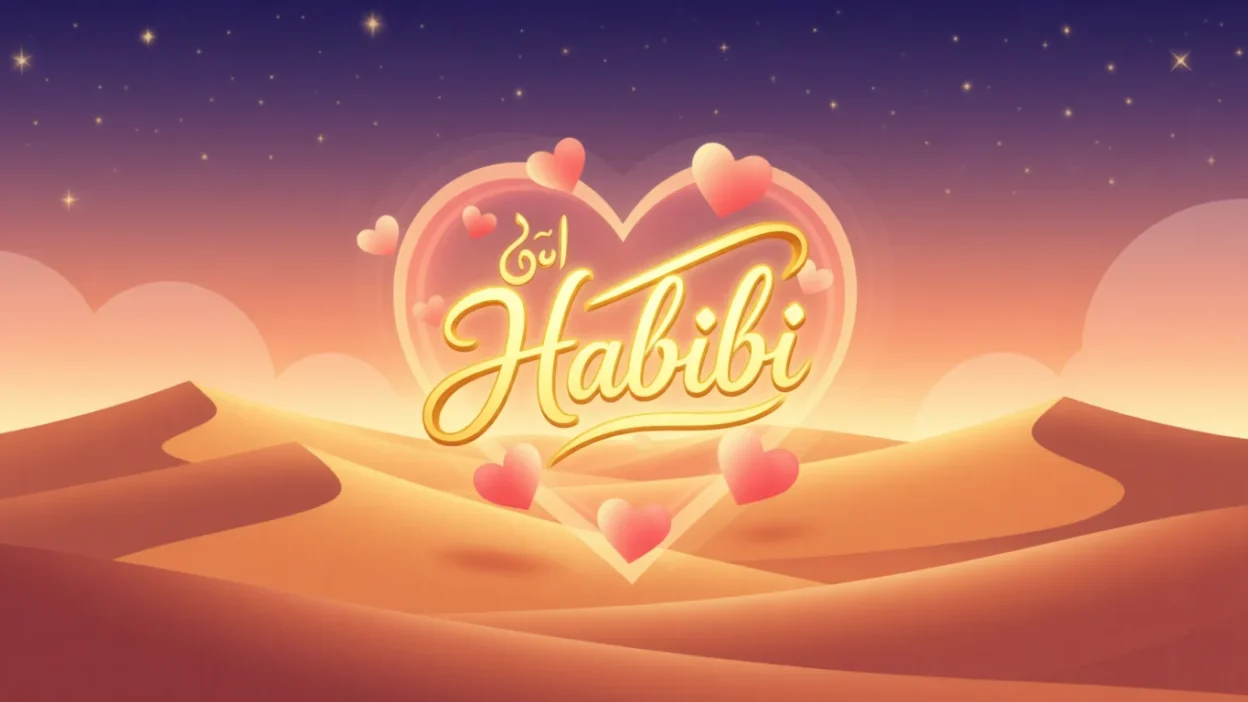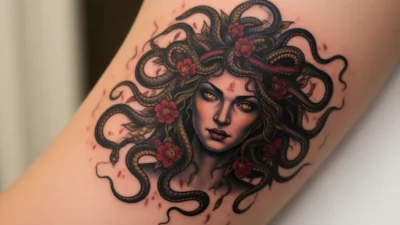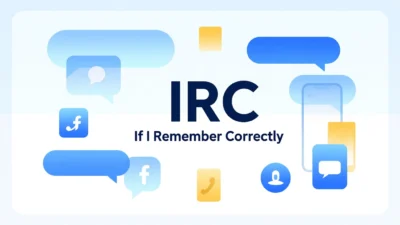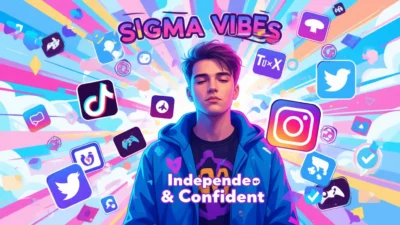Ever seen someone say “Good morning, habibi 😍” on TikTok or in a comment and wondered what it means? I used to see this word everywhere — in songs, memes, even captions — and thought it was just a romantic nickname.
But “Habibi” has a deeper, warmer meaning than most people realize.
Quick Answer:
Habibi (Arabic: حبيبي) means “my love” or “my dear.” It’s a sweet and affectionate way of addressing someone you care about — like saying “darling” or “sweetheart.”
Depending on the context, it can sound romantic, friendly, or even playful.
🧠 What Does “Habibi” Mean in Text?
The Arabic word Habibi (pronounced ha-bee-bee) comes from the root “Hubb,” meaning love.
It literally translates to “my beloved” or “my dear one.” You’ll hear it in songs, Arabic TV dramas, or even from friends greeting each other warmly.
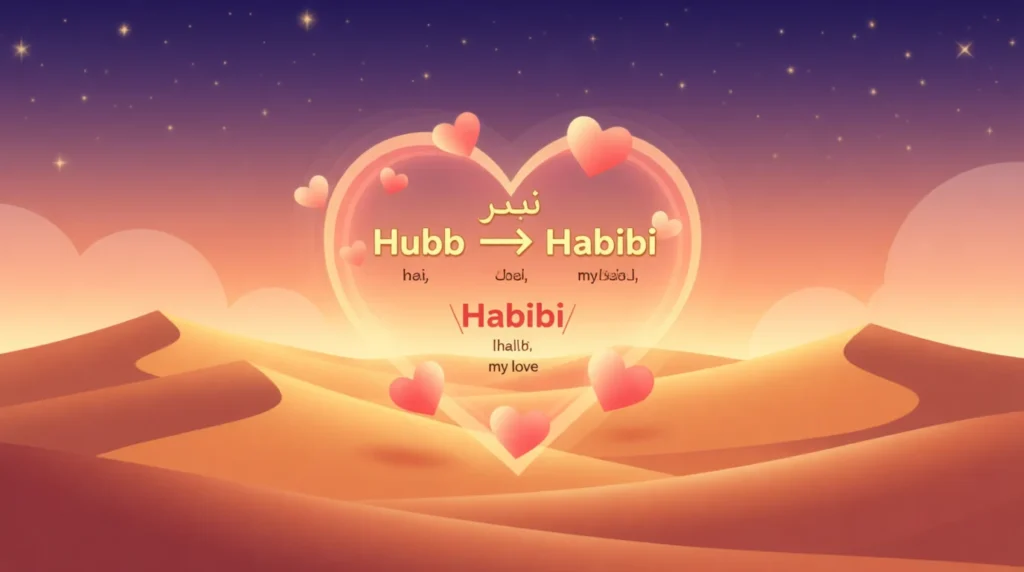
Example:
- “Good morning, habibi! ☀️” → “Good morning, my dear!”
In short:
👉 Habibi = My love / My dear = A sweet, affectionate nickname.
🌍 Where Is “Habibi” Commonly Used?
You’ll hear Habibi almost everywhere in daily life across the Middle East, North Africa, and among Arabic speakers worldwide.
It’s also gone viral globally, thanks to social media and pop music.
Here’s where it’s most often used:
- 💬 Texting and Chats: To greet or compliment someone you care about.
- 🎵 Music: Popular in Arabic and international songs (“Habibi” by Ricky Rich, DJ Snake, etc.).
- 🎥 TikTok & Reels: People use Habibi in captions or hashtags to sound cute or flirty.
- 🕋 Arabic Culture: Common in everyday talk between friends and family.
👉 Tone: Habibi is casual, friendly, and emotionally warm — but not always romantic.
💬 Examples of “Habibi” in Conversation
Let’s see how Habibi looks in real-life chats:
Example 1
A: you coming to dinner tonight?
B: of course, habibi! 🍽️
Example 2
A: miss you bro 😢
B: miss you too, habibi ❤️
Example 3
A: that outfit looks amazing!
B: thank you, habibi 😘
Example 4
A: can you help me move this weekend?
B: anything for you, habibi 💪
Example 5
A: what’s up, habibi?
B: just chilling, how about you? 😎
Example 6
A: saw your post! fire 🔥
B: haha thanks, habibi 😅
These examples show that Habibi works with both friends and romantic partners — it all depends on the tone and relationship.
🕓 When to Use and When Not to Use “Habibi”
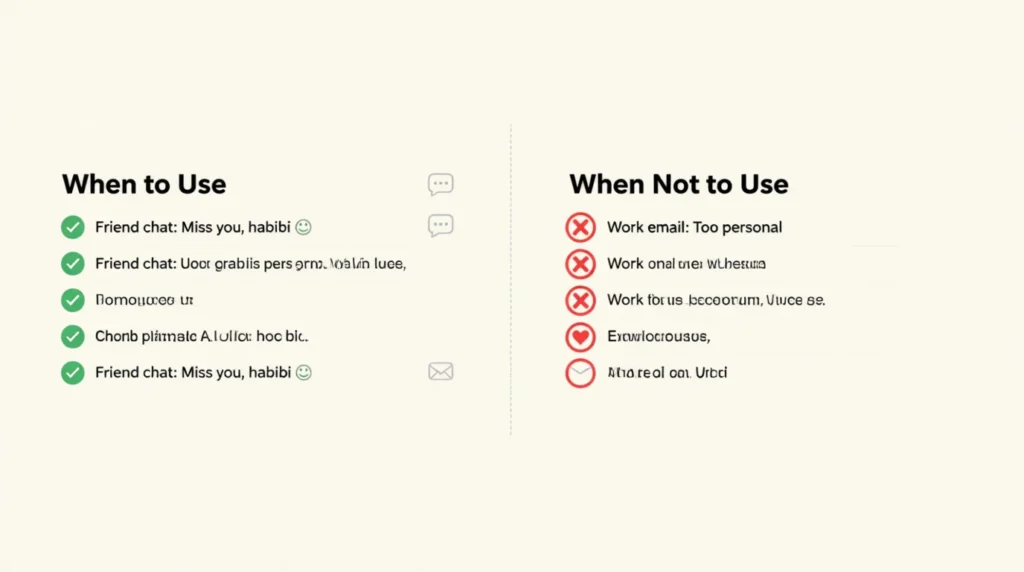
✅ When to Use
- With close friends or family (to express warmth or care).
- When you’re being romantic or flirty with your partner.
- When you want to sound playful or affectionate online.
- As a friendly greeting among Arabic speakers.
❌ When Not to Use
- In formal settings or business emails.
- With strangers who might misunderstand your tone.
- In professional conversations — it may sound too intimate.
📊 Comparison Table
| Context | Example Phrase | Why It Works / Doesn’t Work |
|---|---|---|
| Friend Chat | “Miss you, habibi 😄” | Casual and warm tone |
| Romantic Partner | “Goodnight, habibi ❤️” | Expresses affection naturally |
| Work Chat | “Thanks, habibi” | ❌ Too informal for work |
| Social Media | “Out with my habibi 😍” | Playful, popular on TikTok or Instagram |
| “Dear Habibi,” | ❌ Not suitable — sounds overly personal |
🔄 Similar Slang Words or Alternatives
| Slang | Meaning | When to Use |
|---|---|---|
| Habibti (حبيبتي) | “My dear” (used for females) | When addressing a woman or girlfriend |
| Ya Habibi | “Oh my love” | More emotional or romantic context |
| Ya Amar | “My moon” | Romantic nickname for someone special |
| Ahebak / Ahebek | “I love you” | Romantic expression (male/female) |
| My Love / Babe | English equivalents | Common in texting or casual chats |
💡 Pro Tip: If you’re talking to a girl, say Habibti (ha-beeb-tee) instead of Habibi.
Arabic is gendered, so the ending changes slightly!
🌏 Origin and Cultural Background of “Habibi”
Habibi comes from the Arabic word “ḥubb” (حب) meaning “love.” It’s used across Arabic-speaking countries like Lebanon, Egypt, Saudi Arabia, Jordan, and the UAE.
But here’s the beautiful part — it’s not limited to romantic partners.
Parents call their children Habibi, friends call each other Habibi, and even strangers might say it kindly, like “Thank you, habibi,” as a friendly gesture.
In Western culture, Habibi became popular through:
- 🎶 Music hits like “Habibi Ya Nour El Ain” by Amr Diab.
- 🌐 Viral memes and TikTok sounds featuring Arabic terms of endearment.
- 💬 People using it playfully even if they don’t speak Arabic — a sign of warmth and global cultural blend.
💞 Emotional and Modern Use of “Habibi”
In modern slang, Habibi has become more than a word — it’s a feeling.
When someone says it online, it can mean:
- “Hey, my friend!”
- “You’re adorable!”
- “You’re special to me.”
It adds a personal, emotional spark to messages, especially when paired with emojis like ❤️ or 😍.
So if someone calls you Habibi on TikTok or Instagram — they’re probably being kind, flirty, or just spreading good vibes.
❓ FAQs About “Habibi”
Q1. Is “Habibi” only for romantic partners?
No — it can be used for friends, siblings, or anyone you’re close to. It’s about warmth, not just romance.
Q2. Can a girl say “Habibi”?
Yes! Girls can say Habibi to a guy, and Habibti to another girl.
Q3. What language is “Habibi” from?
It’s from Arabic, spoken widely in the Middle East and North Africa.
Q4. What’s the difference between “Habibi” and “Habibti”?
Habibi is for males; Habibti is for females. Both mean “my love” or “my dear.”
Q5. Is “Habibi” used in Islam or religious texts?
No, it’s not religious — it’s cultural and emotional, used in daily life.
Q6. How do you pronounce “Habibi”?
Say it like ha-bee-bee — soft “h,” stress on the second syllable.
💬 Final Thoughts
Habibi isn’t just a word — it’s a connection.
Whether it’s said by a mother to her child, a friend to another, or a lover to their partner, it carries warmth and care.
It’s no surprise this beautiful Arabic word has crossed borders and platforms — from songs to social media, Habibi has become a symbol of love that everyone understands. ❤️
So next time someone calls you Habibi — smile. You’ve just been called “my dear.”

Hadi Bhatti is a passionate writer and content creator at Saypadia, known for turning complex words, phrases, and internet slang into simple, easy-to-understand explanations. With a strong interest in language, meanings, and digital communication, Hadi focuses on helping readers understand what words really mean in everyday use. His writing style is clear, engaging, and user-focused, making learning both practical and enjoyable.

